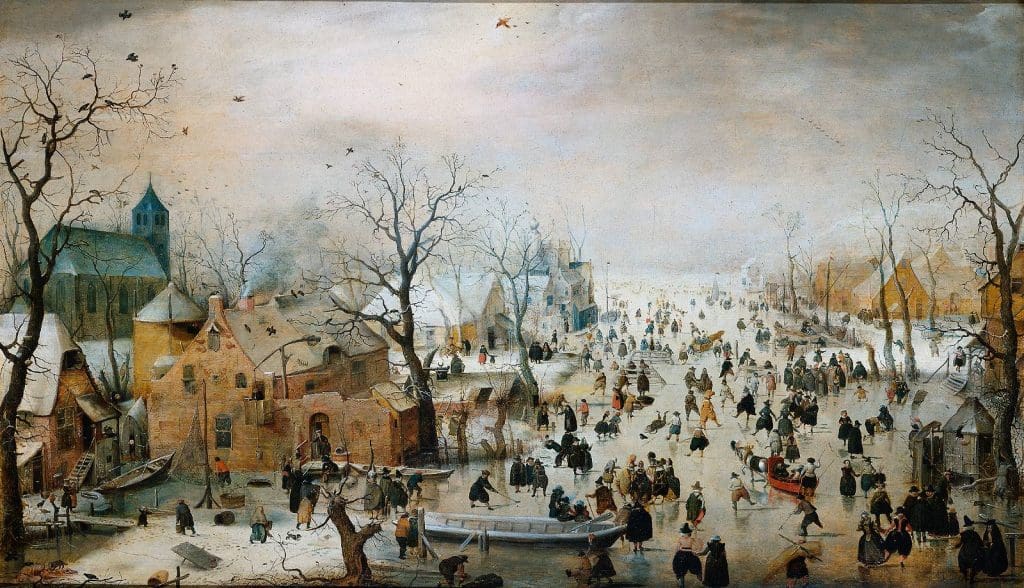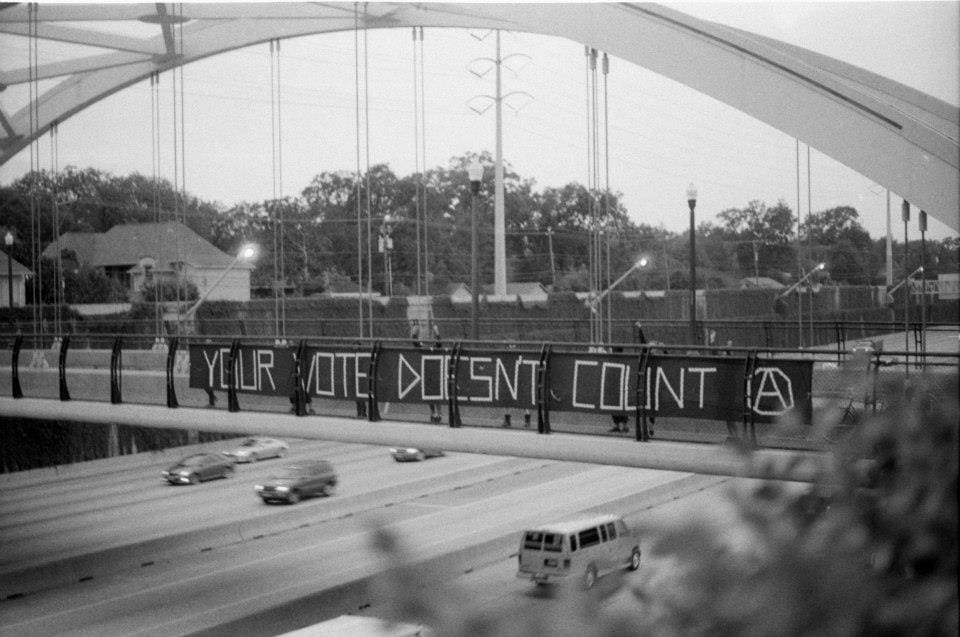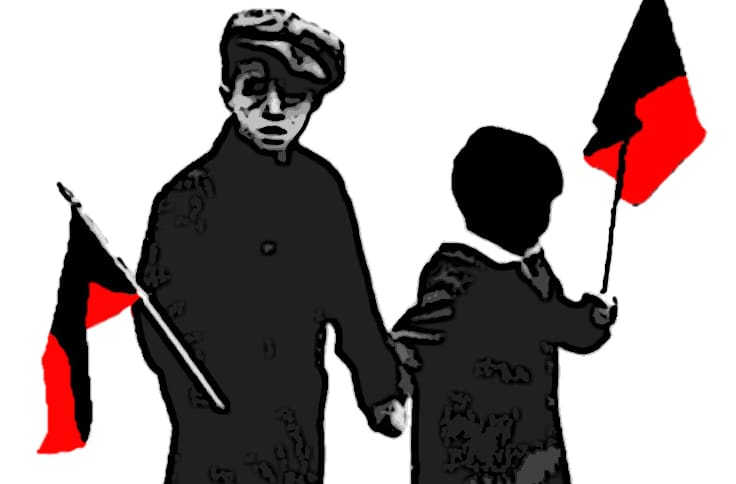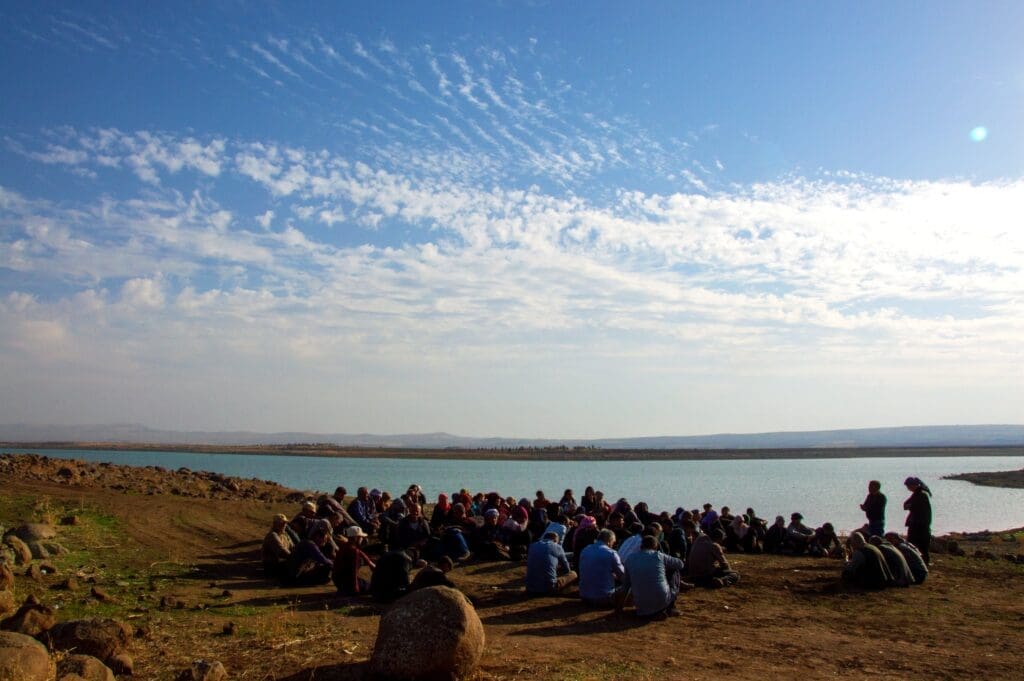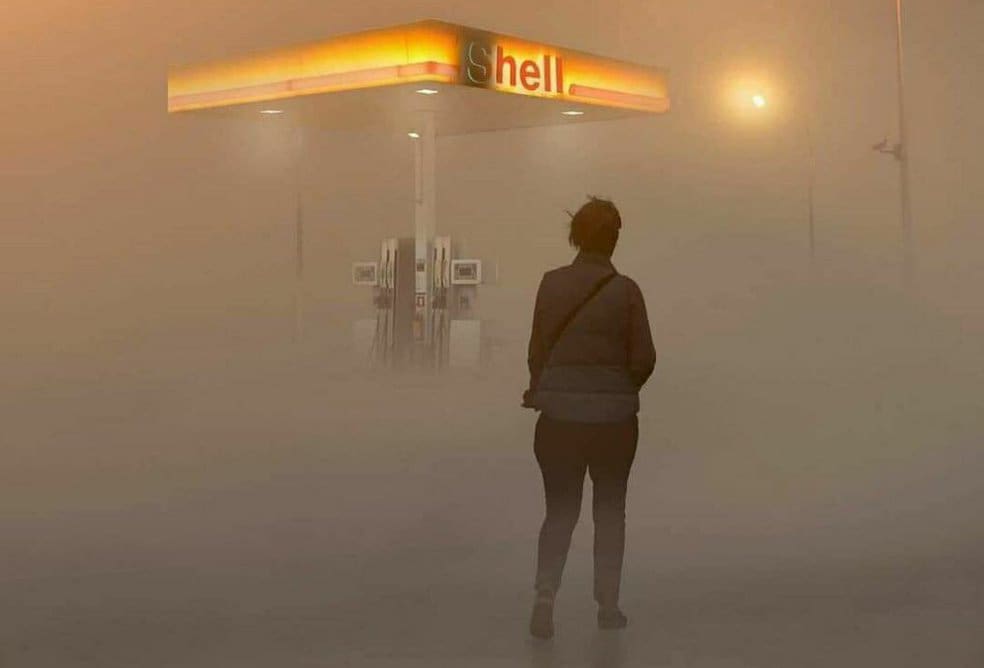This Time, Toward Emancipation: Climate Change and Social Upheaval
“What was a recipe for success in the Little Ice Age has turned into a trap.”
Interview with Philipp Blom
by Raul Zelik for Die Wochenzeitung (Switzerland)
17 August 2017 (original post in German)
The historian Philipp Blom explains how the period of cooling in the sixteenth and seventeenth centuries led to humanity relating to the world in a fundamentally new way. In his July 2017 pamphlet Was auf dem Spiel steht [English: What is at Stake; publication expected in 2019 (New York: Liveright)], he issued an urgent warning: do not underestimate the consequences of climate change.
Raul Zelik: Your February 2017 book, Die Welt aus den Angeln [English: Nature’s Mutiny; publication expected in 2018 (New York: Liveright)], is about a change in the climate that happened around the seventeenth century: the so-called Little Ice Age. You start with the winter landscapes of the Dutch Golden Age painter Hendrick Avercamp. Why?
Philipp Blom: Before then, neither the winter nor the landscape had been a subject for painters. With the onset of the Little Ice Age, nature became an object of observation, because its cycles had suddenly gotten so out of whack.
Avercamp’s Winter Landscape with Skaters, typical of paintings in this genre, resembles something like a Where’s Waldo of the time: there are a lot of people gathered, without there being any obvious occasion. They all look happy on the ice. No one is building a fire; no one seems to be freezing. So it is quickly apparent that it is an allegorical image. Rich and poor have something in common: they are all on thin ice. People are dependent on one another; even aristocrats could fall through. And as an ironic counterpoint, high above and right in the middle, a bird flies by—right there, where the Holy Ghost would typically have been. So it is also as if God is already beginning to exit the stage.
RZ: The great social historian Fernand Braudel tells the early history of capitalism in terms of plagues, cities, and commerce. You do something similar, but with weather.
PB: We are used to regarding history as the history of human activity—books, battles, and noble weddings. This derives from a nineteenth-century worldview (and, reaching further back, a Christian worldview): that humans are exalted over nature. Nevertheless, we are simply primates that are just as dependent on nature as any other animal.
RZ: To what extent did the Little Ice Age—a climate phenomenon for which there has been no definitive explanation—contribute to the leap into capitalist modernity?
PB: Although the causes of the Little Ice Age have not been identified, we can still reconstruct its progression over time. The first really big cold wave set in around 1570; somewhere around 1685 or 1700 the worst of these exceptionally harsh winters started to die down. During this time, the change in climate caused crops to fail more and more frequently, and since all of Europe subsisted on grain agriculture, this shook the very foundations of society. There were three times as many famines as before; illnesses spread; grain prices rose.
In the face of all this, people had to look for new ways of doing things, and a new sort of people were doing the innovating: people who lived in cities and knew how to read and write. Today they would be considered the middle class. They were ready to think beyond old structures: they no longer plied their trades exclusively within guilds; they began developing and expanding the concepts of manufacturing and commerce; and they began to get more empirical in their observation of nature.
RZ: Still, education had already been growing in significance in parts of Europe, for instance in the cities of Italy, even before that.
PB: That is true, but the Renaissance had remained an elite phenomenon. And the Reformation, which had rocked political life in the sixteenth century, didn’t bring a fundamentally new epistemology or set of relations with it. Most people still lived in the countryside and had little contact with money. The Jahrmarkt [yearly market] was so called because it happened once a year. In other words, markets played only an ancillary role; it was the aristocratic courts and the church that were dominant.
In the crisis of the Little Ice Age—which was a worldwide phenomenon, by the way—different people in different places reacted differently. Amsterdam, for instance, was a rather small, insignificant city back then. Still, some merchants started to import grains from the Baltic region, where the fields were larger and the population was smaller. And they realized that they could expand this model. They sailed to the “East Indies”—Southeast Asia—to buy spices, or imported sugar and tobacco from the slave plantations in the Caribbean. To help offset the financial risk of losing a fully-loaded ship, stock markets were founded. Thus this new set of relations, and a new orientation to the world, began to emerge.
RZ: What in particular changed about people’s behaviors and biographies?
PB: It used to be that if a tradesman got rich, he maybe bought a couple of buildings, but he remained a tradesman. He invested in his social capital here and there—by furnishing windows for a church, for instance. Now, however, people were actively trying to climb the social ladder. Rembrandt’s father was a miller, but he sent his son to Latin school.
Progressive changes in the cultural paradigm are also apparent in people’s changing responses to the Ice Age itself. Initially, these were totally Medieval: religious processions and prayer services, witch hunts. By the time we get to 1680, on the other hand, the great comet of that year receives a scientific explanation from the author Pierre Bayle. What we see up there in the heavens, Bayle wrote, is not a sign from God, but simply a lump of rock.
RZ: It’s a not a clear progression, though, but rather a kind of tension: on the one hand there is superstition, and on the other the radical enlightenment of, say, Baruch Spinoza, whom you mention in the book. That begs a comparison to the present day, in which regression and emancipation stand side by side.
PB: I would describe the transition into modernity that began during the Little Ice Age as a movement out of the Fortress and into the Market. Now, an observation of the Hungarian economist Karl Polanyi comes into play here: markets do not exist in isolation. In real life there are no “free markets.” Society has to provide infrastructure and legal frameworks for them to exist. Conversely, markets also alter society—and not only for the worse, historically speaking. For instance they tend to foster tolerance and provide rule-based frameworks for human activity, justice systems.
Today we are experiencing a tension, you’re right. A large segment of our society wants to continue living out in the Market, but ever more people want back into the Fortress. Markets are bad at giving people feelings of belonging, security, and identity. Beyond that, they demand constant change and thus a certain instability. This is especially horrible for those who don’t benefit from change, of course. So it’s understandable, in a way, that the old Fortress is coming back as an appealing vision, since it seems to offer an authentic identity.
RZ: What does that mean for democracy? In many places it seems to be under pressure.
PB: Neither the Market nor the Fortress is necessarily democratic. The Market perhaps a bit more, because it theoretically requires openness and transparency. But these days we are finding out that unregulated markets aren’t particularly interested in democratic participation, and they reduce the entire universe of Enlightenment inquiry to economics: Freedom means freedom to consume; Rationality means rationalization.
The other option—the Fortress—is even more fatal, though. Its response to fluid, amorphous modernity, and the accompanying loss of orientation within it, is to build walls.
RZ: One expression of the crisis today seems to be that the risk of war is intensifying. Let’s look back once more: was the Thirty Years’ War—which also happened in the seventeenth century—a result of the Little Ice Age?
PB: No, it began as an internal power conflict within the Habsburg dynasty, between Protestant noblemen and their Catholic monarch. But the innovation that came along with the rising middle class also had a major impact on the waging of war. The nobility was collecting less in taxes because of the bad harvests; simultaneously, waging war was becoming more expensive. Technological innovation, above all the development of the musket, entailed a real revolution: it was a very effective weapon—for the use of which soldiers had to be much better trained. They had to learn new standardized maneuvers to fire and reload most efficiently. This was a kind of industrialization. In order to train the soldiers, they were stationed in barracks, which also made waging war that much more expensive.
Because nobility and royalty were in competition with one another, this also accelerated the formation of administrative states which organized the levying of taxes. And the merchant class—indeed the first economic thinkers of Europe—reflected on this theoretically, and said something remarkably current: that the economy, for them, was a zero-sum game. If I get richer, neighboring countries will get poorer. So it became about cheap production and export in order to import gold. And who should carry out this cheap production?
RZ: The poor, of course.
PB: Exactly. They cannot be allowed to starve, but they also cannot be allowed to believe that they have any right to a better position in society. We have to keep them down. Thus an economic paradigm emerged which remains today: economic growth based on exploitation. It was with this recipe that Europe rose to become the dominant economic power in the world. And it is precisely this expoitation-based economic growth that is threatening our societies today. Because there cannot be any such thing as infinite growth. What was a recipe for success in the Little Ice Age has become a trap.
RZ: How come it was Europe that became so central in this phase of the seventeenth century? As you pointed out, the challenges presented by this period of climate change affected other regions of the world, too.
PB: I don’t have a good answer for that. It surely has to do with technological capacities like book-printing, ship-building, or the development of firearms. That wasn’t happening on other continents, or not in the same forms. Still, that doesn’t mean that it could never have happened elsewhere. That is one of the greatest puzzles of history. Europe was not “more civilized” than other regions of the world.
RZ: The triumph of mercantilist principles goes hand in hand with the forcible privatization of the commons as well as the subjugation of any economies founded on notions of justice and fairness. Karl Polanyi referred to this process as the “disembedding” of markets. Many social critics seem to be reaching for their Polanyi right now. Why do you think that is?
PB: Polanyi is important because he refused to look at economics in isolation. For him, economics was only one mode of expression within human society. That means that it really matters how we think of and relate to markets within our societies. On the see-saw between society and the market, the balance has to be continually recalibrated.
And especially because the opposite claim has become dogma, we must emphasize once again: there is no such thing as a “free market.” Markets can only exist because there are roads that can be used to transport goods, because people learned to read and write in schools, because there is a whole structure in place—laws, police, courts—that guarantees and enforces contracts.
What I think is so great about Polanyi is his ability to drop kernels of wisdom almost in passing. For example that it is the task of politics to slow the rate of transformation down enough to be socially digestible. We should not forget, however, that he was also a Stalinist and viewed the crimes of the Soviet Union as collateral damage.
RZ: You mentioned that enlightenment and exploitation have always been interlinked in the history of the West. Are Western ideas about freedom and human rights self-deluding?
PB: Definitely, and we should always be aware of that. What good is freedom if I’m hungry? In order to create the preconditions for the realization of freedom, we need the infrastructure of society. We built this infrastructure by exploiting people—industrial workers, the colonized, and so on.
This is not to say that the idea of freedom is in itself corrupt. It just means, first of all, that we have to take care about what forms the basis for freedom, and second, that we should be much more humble in our regard of other civilizations and their histories. The liberal democracies as we know them today are not some inevitable, natural state.
Women were only allowed to vote in France in 1945; in Switzerland, 1971 (and in the canton of Appenzell, 1991). This democratic advance had a lot to do with economic growth—growth based on the rapidly increasing use of fossil fuels. Our democracies would never have emerged in the first place without an oil boom.
And we don’t really know how democracies are supposed to work without rising prosperity. The basic promise, of course, has always been that your children will be better off than you. But this means that the economy has to keep growing—which is an insane model on its face.
RZ: In the book, you only implicitly raise the question of climate change. Therefore you followed up with another book only months later, What is at Stake. Draw the parallels for us: does the climate change we are experiencing now present a chance like the Little Ice Age of the seventeenth century did? Could the emancipatory side of the Enlightenment persist and prevail?
PB: Yes, it could. But I don’t believe that we’ll accomplish that fast enough. There are various models for calculating climate change, and “tipping points” play an important role in all of them. Once these points are crossed, then changes proceed automatically. We don’t know precisely where they are or even if we are perhaps already past some of them. Nonetheless it is clear that we have very little time—in the best case, a generation.
And the contents of what people carry around in their heads can’t just be switched out and replaced. For a long time now, we have been bringing people up to think of themselves not as citizens but as consumers. Their only obligation is to repay debts. If they can do that, they can do whatever else they want to do—which, by the way, is a brilliant mechanism for keeping people under pressure. They will never be good enough to live up to the religious icons smiling out at them from all the billboards.
There is an awareness that we have to fundamentally alter society if we don’t want to disappear as a civilization, or even perhaps as a species. The technology and concepts for the required transformation are all here. Of course it implies that we will have to go without certain things. We will consume less, and be less mobile.
RZ: How can we convince people to participate in such a transformation?
PB: Don’t misunderstand: I’m not trying to be a scold. I believe that in many societies, capitalism is the best model. Socialism only functions if everybody believes in it. Otherwise you have to start establishing a repressive state. Capitalism, on the other hand, is really good at bringing people with totally different worldviews together in the same rule-governed activity. And in pluralistic societies—which we want of course—this is very valuable. But it is also clear that we have to use markets intelligently, to make a better life possible for ourselves as people and for the rest of nature. Right now it’s the other way around; right now, these tools are using us.
More on Philipp Blom and his work:


Historian and author Philipp Blom (b. 1970, Hamburg, Germany) has been examining dynamics in social history, knowledge, inquiry, and crisis for many years. In his book Der taumelnde Kontinent [English title: The Vertigo Years] (2008/9) he retraces the years before World War One in Europe, 1900-1914. In his book published at the beginning of 2017, Die Welt aus den Angeln, Blom investigates the effects of the seventeenth-century Little Ice Age, and puts forward the thesis that this change in the climate from 1580 on drove and accelerated the social transition from the Middle Ages into the Age of Reason and modernity. The development of global trade and the rise of an education- and status-oriented middle class, as well as the proliferation of scientific and enlightenment thinking, are interpreted by Blom as responses to the challenges of a climate crisis.
This summer, he also came out with the polemic Was auf dem Spiel steht, in which he discusses the climate change of the present and describes how the crisis is fueling the conflict between rightwing populism and neoliberalism. He paints a dramatic picture of the current situation: digitization, automation, and climate change have made a rapid and fundamental transformation in society necessary. Still, there exists neither the social majority nor the necessary political mobilization to accomplish this. Instead, large segments of the elite and the public are reacting by returning to the principle of the Fortress.
—Raul Zelik
Translated by Antidote
Featured image: Hendrick Avercamp’s Winter Landscape with Skaters

